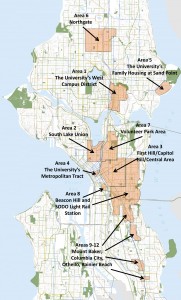
The City of Seattle today announced an agreement with broadband developer Gigabit Squared that plans to use the city’s excess fiber-optic capacity to provide an “ultra high-speed” fiber-to-the-home/business broadband network starting in Fall 2013 with demonstration projects in 12 Seattle neighborhoods, including portions of North Beacon Hill and other Southeast Seattle neighborhoods. An additional part of the project is the development of dedicated broadband wireless connections to multifamily housing and offices, and “next generation” mobile wireless Internet.
The City, the University of Washington, and Gigabit Squared have signed a memorandum of understanding and a letter of intent that allows Gigabit Squared to begin raising the capital needed for the first phase of the project.
That’s the good news. The bad news is: only a small part of Beacon Hill is included in the demonstration project (see this map or this map), so this will only improve things for a limited number of residents. However, Gigabit Seattle asks that you sign up on their website to show your interest in having the service so they can determine where to expand next.
Here’s how the city described the plan today in a press release:
1. Fiber to the home and business: Gigabit Seattle plans to build out a fiber-to-the-home/fiber-to-the-business (FTTH/FTTB) network to more than 50,000 households and businesses in 12 demonstration neighborhoods, connected together with the excess capacity that Gigabit Seattle will lease from the City’s own fiber network. Gigabit Seattle’s technology intends to offer gigabit speeds that are up to 1,000 times faster than the typical high-speed connection.
The initial 12 neighborhoods include: Area 1: the University of Washington’s West Campus District, Area 2: South Lake Union, Area 3: First Hill/Capitol Hill/Central Area, Area 4: the University of Washington’s Metropolitan Tract in downtown Seattle, Area 5: the University of Washington’s Family Housing at Sand Point, Area 6: Northgate, Area 7: Volunteer Park Area, Area 8: Beacon Hill and SODO Light Rail Station and Areas 9-12: Mount Baker, Columbia City, Othello, and Rainier Beach.
2. Dedicated gigabit to multifamily housing and offices: To provide initial coverage beyond the 12 demonstration neighborhoods, Gigabit Seattle intends to build a dedicated gigabit broadband wireless umbrella to cover Seattle providing point-to-point radio access up to one gigabit per second. This will be achieved by placing fiber transmitters on top of 38 buildings across Seattle. These transmitters can beam fiber internet to multifamily housing and offices across Seattle, even those outside the twelve demonstration neighborhoods, as long as they are in a line of sight. Internet service would be delivered to individual units within a building through existing wiring. This wireless coverage can provide network and Internet services to customers that do not have immediate access to fiber in the city.
3. Next generation mobile wireless internet: Gigabit Seattle will provide next generation wireless cloud services in its 12 neighborhoods to provide customers with mobile access.
See more about today’s announcement at the Seattle Times, which points out that parts of the East Side already have fiber broadband, and residents of Ephrata in Grant County have “one of the world’s fastest broadband services” — for $45 per month. Some parts of Seattle already have access to this speed as well, including the South Lake Union neighborhood through CondoInternet, which charges $200 per month for their “up-to-gigabit-speed” service. Gigabit Seattle has yet to finalize the rates for their service.
According to the Gigabit Seattle website, “the more interest we have in your area, the higher priority your neighborhood will become.” They ask that all interested people sign up at their website to show interest in receiving this service to their neighborhoods.
